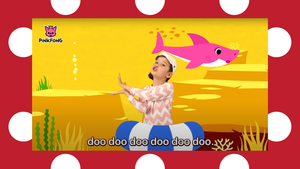The Supreme Court in South Korea has ruled that the Pinkfong version of ‘Baby Shark’ - the version everyone knows, it having racked up 16 billion views since being uploaded to YouTube in 2016 - did not infringe the copyright in an earlier version of the song posted in 2011.
Jonathan Wright, aka Johnny Only, made the earlier version, reworking what was a US folk song of unknown origin. The original version of the song is likely public domain, so not protected by copyright. But Wright argued that his version was protected by copyright, and it was that version that South Korean entertainment company Pinkfong had then reworked to make its multi-billion streamed YouTube video.
However, the top court in Korea has affirmed lower court rulings in the country that Wright’s version of ‘Baby Shark’ “did not involve substantial modifications to the folk tune related to the case to the extent that it could be regarded, by common social standards, as a separate work”.
Pinkfong has always insisted that it based its version of ‘Baby Shark’ on the original song, something it reiterated in a statement responding to the Supreme Court ruling. Its team then added “an upbeat rhythm and catchy melody” to the song, the statement added, “turning it into the pop culture icon it is today”.
It’s thought the ‘Baby Shark’ song began as a campfire chant at children’s summer camps in the US at some point in the mid 20th Century, possibly inspired by the film ‘Jaws’.
However, the original version is less toddler-friendly than Pinkfong’s viral hit, in that later verses document limbs being lost, one by one, as the shark attacks. American children’s entertainer Wright removed the more gory lyrics from his version of the song to make it suitable for younger children.
Although possibly being first sung in the 1970s, ‘Baby Shark’ is considered a public domain folk song because of its origins and unknown authorship.
If an artist takes a public domain song and then adapts it in some way, they usually create a separate ‘derivative work’ that is protected by copyright, with the artist who did the adaptation the default owner of that copyright. If other people then use the new version of the song, they need to get permission from the rightsholder in the usual way.
Though quite how much adapting needs to happen to create a new ‘derivative work’ is debatable and legal precedent will differ from country to country.
Plus if another artist makes their own new version, it can sometimes be hard to ascertain whether they started with the public domain original or the earlier copyright protected adaptation.
When Wright first filed a lawsuit over the rights in ‘Baby Shark’ back in 2019, he explained that he was prompted to pursue litigation after hearing that Pinkfong had been threatening legal action itself over the use of its version of the song by a South Korean political party.
That suggested that Pinkfong believed its version was protected by copyright under South Korean law and, he told CBS, “the wheels in my head start turning... Doesn’t that mean that my version also has copyright protection?”
But, alas, under South Korean law, no it does not. The Supreme Court was upholding previous lower court rulings that were made in 2021 and 2023.

